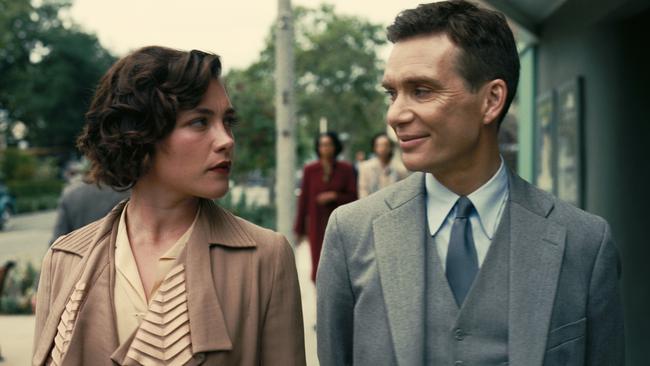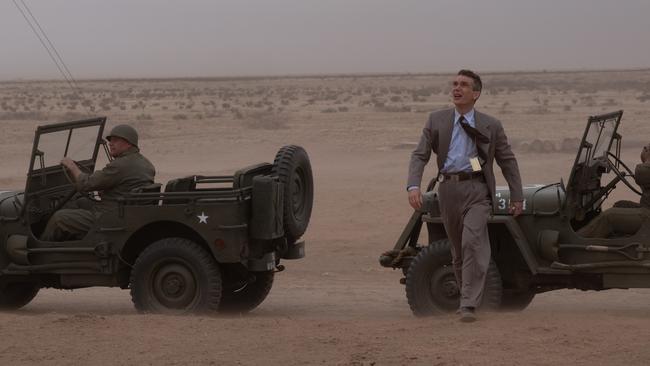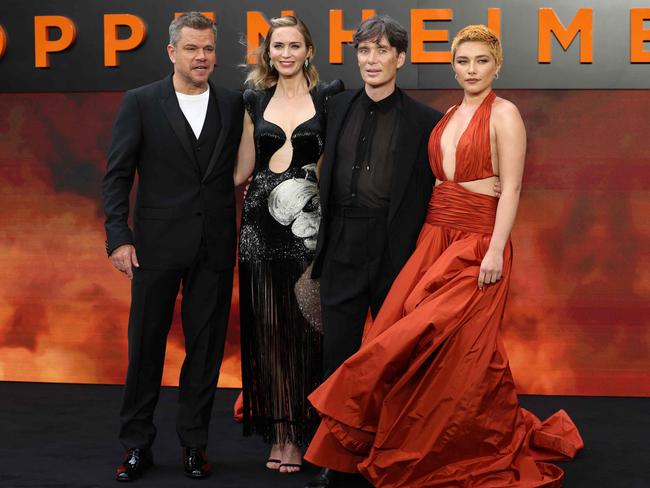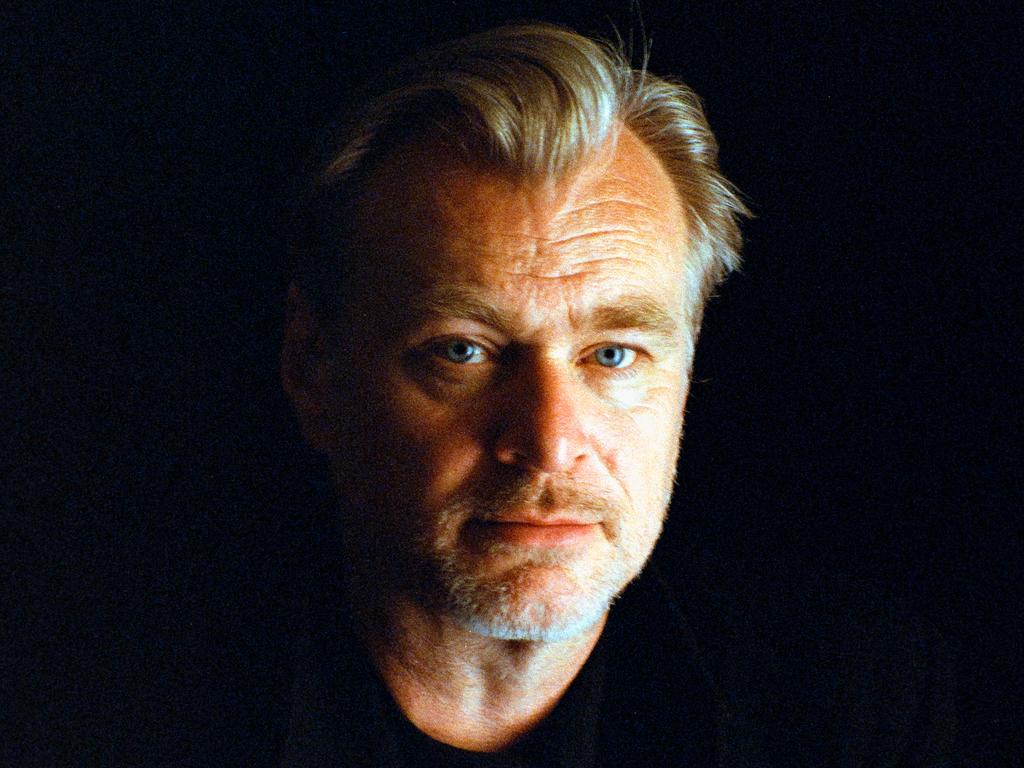Oppenheimer review: All-star cast steals the show in Christopher Nolan masterpiece
Christopher Nolan has done it again. He’s turned a story we know into an edge-of-the-seat drama. Tossing up between seeing this and Barbie? Watch both. You will not regret it.

Oppenheimer (MA15+)
In Cinemas July 20
★★★★½
Boom. Christopher Nolan has done it again. He’s taken a historical story we know a bit about and turned it into an edge-of-the-seat, heart-in-the-mouth drama.
In 2017 it was his World War II masterpiece Dunkirk. Now it’s Oppenheimer, centred on J. Robert Oppenheimer, the theoretical physicist known, for better and worse, as the father of the atomic bomb.
We know the Allies made it out of Dunkirk and we know the bomb was created and dropped on Hiroshima and Nagasaki. Nolan’s interest is in how it happened and the people who made it happen.
That means this three-hour movie is character-driven. It’s about the race to build a bomb that will incinerate a city and its inhabitants but the drama, tension and conflict is between the people involved.
This human fission of the Manhattan Project is brought to life by an outstanding cast, led by Irish actor Cillian Murphy aka Thomas Shelby from Peaky Blinders, as Oppenheimer.
Nolan is a director everyone wants to work with. As a result, Oscar winners pop up, sometimes for only five minutes, because they want to be there.
Gary Oldman, for one, is worth waiting for as US president Harry S. Truman. He tells Oppenheimer he may have built the bomb “but I dropped it’’. He calls the scientist a “cry baby”.
Casey Affleck is a military interrogator Oppenheimer is warned he never wants to meet. Florence Pugh is the communist writer who has regular physical liaisons with the physicist.
Rami Malek is there when the shoe drops and the disparate but related plot strands come together. Tom Conti’s Albert Einstein is – once the ending is revealed – perhaps one of the most important cameo roles I’ve seen.
And if you think of Robert Downey Jr only as Iron Man, you should see this film, in which he is Lewis Strauss, head of the Atomic Energy Commission (AEC). I want to say he steals the show but that would be unfair as every actor involved steals it, including Josh Hartnett and Jason Clarke.
In a recent interview, Matt Damon said he had promised his wife he would take a short break from work, “with one caveat. Unless Chris calls”.
Chris did call and Damon, as Leslie Groves, the US Army colonel in charge of the Manhattan Project, is extraordinary. When he explains why the bombs, plural, must be dropped, it is chilling.
“You are a dilettante, a womaniser, a suspected communist … erratic, egotistical, arrogant …” he tells Oppenheimer the first time they meet. Then he hires him.
Much of what he says is true, at least in this cinematic interpretation of Oppenheimer’s life, which the director has stressed “is not a documentary”.
The main source material, other than Nolan’s imagination, is Kai Bird and Martin J. Sherwin’s Pulitzer Prize-winning 2005 biography, American Prometheus.
The Oppenheimer we see is hard to read. No one, including himself, denies he is a genius. Yet he is a deeply flawed one. He is a terrible husband (Emily Blunt is a bit underused as Katherine Oppenheimer) and father.
In the larger world, some see him as the messiah, some as the devil, some, such as fellow physicist Ernest Lawrence (Hartnett) as something in between.
The Manhattan Project site in Los Alamos, New Mexico, is described as the “cult of Oppy”. He is “founder, mayor, sheriff all rolled into one”.

How he sees himself is unclear. Murphy captures this wonderfully. Like Thomas Shelby, Oppenheimer at times seems emotionally detached from his actions.
Nolan decided not to use computer-generated special effects, which means for a movie about a bomb there are few explosions. At the Sydney premiere the visual effects supervisor, Australia’s Andrew Jackson, joked that people would think he did nothing.
That’s not true, of course. The special effects are there but not due to CGI. One of the rawest scenes involves the July 16, 1945, Trinity Test when the world’s first nuclear weapon was detonated in the New Mexico desert.
The scene was made using real explosives. The detonation itself looks incredible – cinematographer Hoyte Van Hoytema is a regular collaborator with Nolan – but what matters more is the look on the faces of the scientists, the raw emotion, as the clock ticks down to the button being pushed.
“Now I am become death, destroyer of worlds,’’ Oppenheimer says, as he did in real life.
Prometheus dared to steal fire from the gods and was sentenced to be tortured for eternity.
That goes to the second half of this story: What happened to the one-time hero Oppenheimer, with his left-wing links, after the war as McCarthyism took hold?

The plot moves back and forward in time. There are crucial questions, such as development of a hydrogen bomb, which Oppenheimer opposed, and two pivotal investigations.
One is a 1959 Senate committee hearing on Strauss’s nomination as US commerce secretary. The other is a 1954 AEC hearing on Oppenheimer’s security clearance.
He is grilled by a lawyer (Clarke, in an impressive performance) who asks, regarding the hydrogen bomb, when he, the man who created the bombs that obliterated more than 100,000 lives in Japan, had developed “moral qualms”.
This goes to one of the fascinating aspects of this “dramatic narrative”, to quote the director, of Oppenheimer’s life. Did he regret what he did or was that “false guilt”, as Strauss calls it. Did he want power at any price or was there a cost beyond which he would not go?
In a powerful piece of filmmaking the Hiroshima and Nagasaki bombings are not seen by us but they are by Oppenheimer. He is shown US military footage and his response – dazed, numbed, hallucinatory – looks so right, whether it happened or not.
Those two bombings are the only times nuclear weapons have been used. Does this mean Oppenheimer was wrong about being the “destroyer of worlds”?
The ending, which repeats an earlier scene between Oppenheimer and Einstein, but this time we hear their conversation, suggests he was not.
This week has been billed as the blonde bombshell (Barbie, which I review here) versus the bomb. Which film to see? The answer is a lot simpler than splitting the atom. No need for mutually assured destruction. See both. You will not regret it.






To join the conversation, please log in. Don't have an account? Register
Join the conversation, you are commenting as Logout